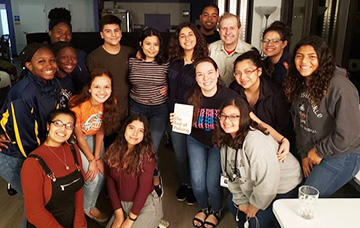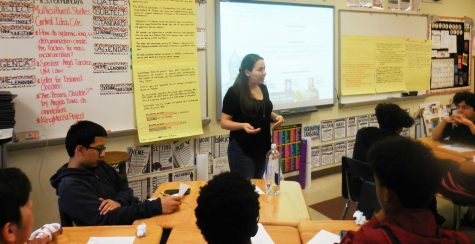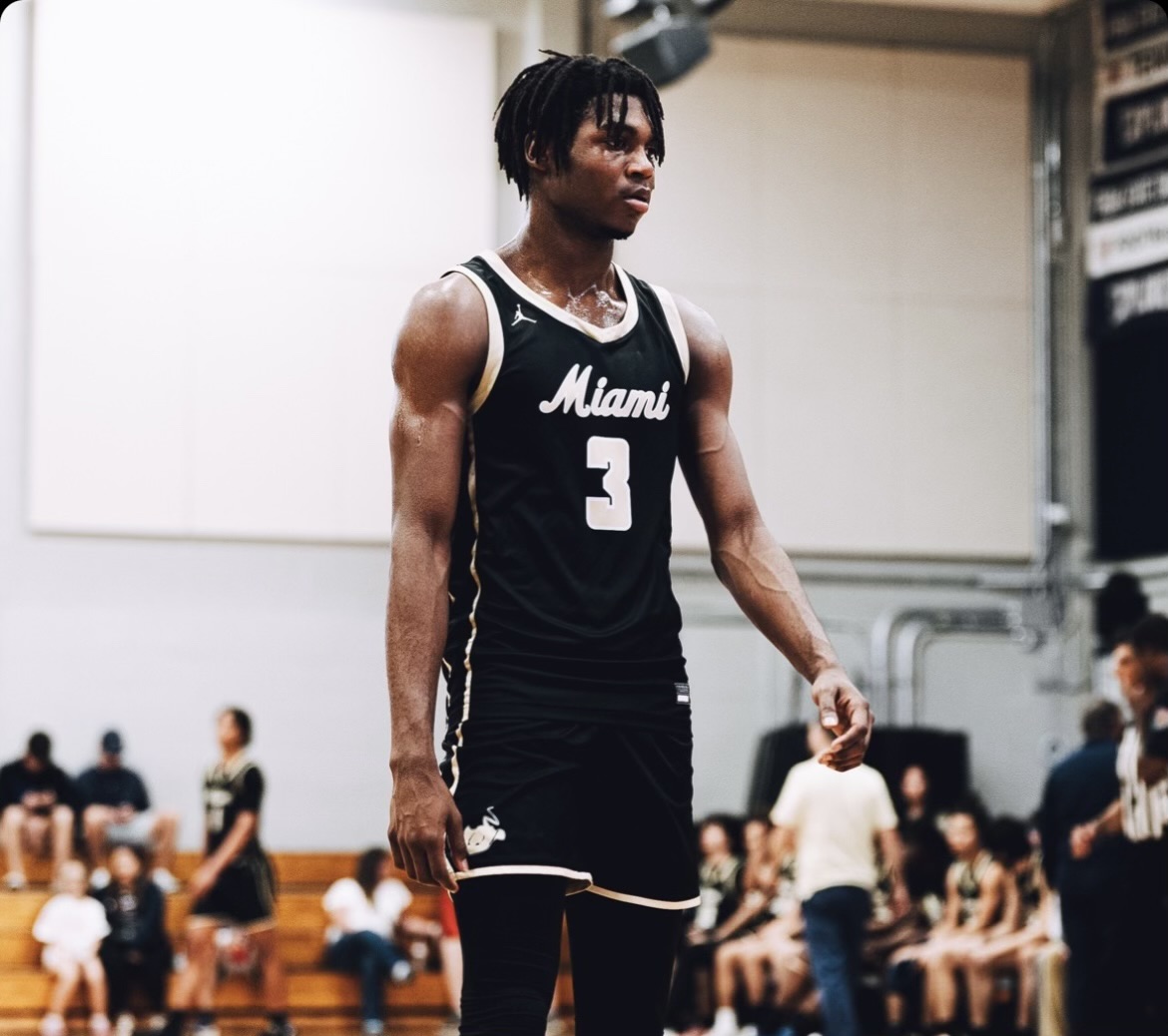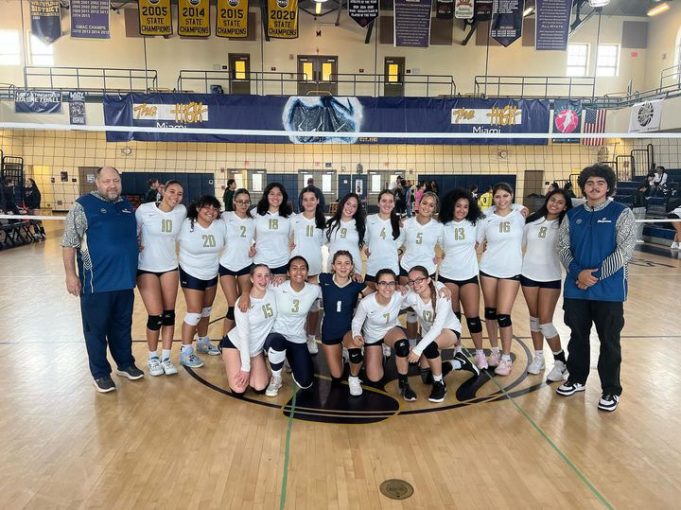Fernandini: Teach with Passion and a Fire in Your Belly
May 29, 2019
Not only do teachers educate students with powerful words, encouragement, and teaching skills, but they can also change the world for them. An example of a brilliant teacher who teaches students about culture, literature, and real world problems, is English and Multicultural Studies teacher Ms. Fernandini.
High school and college years
Ms. Fernandini attended Coral Park Senior High School, where she learned how to ride bikes on the runners’ track, rollerbladed through the hallways, and spent, “Friday nights running up and down the bleachers with the band playing in the background.”
She had a great high school experience: “Too much fun with my friends and a fantastic education with world-class teachers.” She also was in The Rampage, the school newspaper. “We would publish a newspaper once a month, had to sustain the funding for our publications, fight the adults to get our articles printed without censorship (only guidance), and go to Columbia University for competition once a year, where we would place each year we entered. It was like working at an actual newspaper organization!”
After high school, Ms. Fernandini obtained a bachelor’s degree in psychology with a specialty in Applied Behavior Analysis, and a master’s degree in International/Intercultural Education from Florida International University.
Her teaching lifestyle
She first got into teaching when she worked for over two years on a clinical study with at-risk kindergarteners, who were at-risk for behavioral disorders and she saw the educational inequalities throughout the school district.
Next, she was accepted into AmeriCorps’ City Year Miami and placed in Miami Southridge Senior High School. There, she worked with 9th and 10th grade students who were in Intensive Reading classes, but quickly developed relationships with students of all grade levels because of her role as Behavior Coordinator with the Positive Behavior Support program there.
“I fell in love with being in the classroom and supporting my students in any way I could— whether it was doing reading interventions, attending football and basketball games, or talking with my students about their problems and their dreams,” she said. Nothing else mattered to her while she was in the classroom. The only thing that did matter was getting kids to come to and be engaged in school: “By May, I told the principal I wanted a teaching position at the school,” she said.
First responders
When it comes to education, Ms. Fernandini says, “America doesn’t realize this, but as teachers, we are first responders and practitioners. People think of police officers, paramedics, firefighters, and other professions of the like as first responders, but they discount teachers. Our classrooms and school houses are microcosms of society, and what happens out there greatly impacts what happens in here. Before a child ends up in a hospital, a psychiatric facility, a police station, a child welfare system… they were showing signs of distress or need in our classrooms. We have the ability to get to the child before a crisis escalates. Unfortunately, that is not the case for all students, but we can definitely be an advocate for the child and get them connected to resources that will uplift them and give them the help they need.”
She believes teachers have the capacity to deeply influence a child’s life. “If you make the content relatable to the students, teach with passion and a fire in your belly, and have high expectations of the kids, they will have the capacity to be successful,” she said. “That doesn’t mean it happens overnight, or even in ways you can measure on tests. You have to be patient and trust that what you taught and how you taught will eventually set in. I witnessed students turn their lives around completely and, later on, reference it to things that happened in class.”

The Multicultural Studies Class
As students, it’s extremely important to be informed about today’s world, which is why Ms. Fernandini advises students to take her Multicultural Studies class: “The class addresses misinformation and one-sided narratives that are highlighted in literatures, histories, and worldviews in general. It provides and researches counternarratives at the intersections of race, gender, ethnicity, and class that are not generally discussed in traditional and accountable subjects. And yet, these topics bleed into the traditional and accountable subjects. Exposure to college-level texts, critical thinking skills, synthesis and analysis of rigorous material, and— like all the classes I teach— a strong work ethic come from this course.”
She added that the course is designed for students who want to know more about issues exploring intersectional social justice. “Students of color deserve to see themselves reflected in the texts they read and the topics they explore and understand the institutions that intertwine and perpetuate systemic oppression,” she said. “You can’t subvert and overcome systems you don’t understand. Changes in our society have always been led by the young. We need to holistically educate children and challenge dominant narratives to create a better future.”
Life outside of school
When Ms. Fernandini is not inspiring and educating students, outside of school, she is a “foodie and an avid art appreciator.” She said, “I’m always looking for new places to eat with my friends and going to art galleries— especially the smaller ones— is so nourishing to me, in more ways than one.”
She also tries to spend as much time as she can with her husband, since they have opposite schedules. “I wouldn’t be able to do a fraction of what I do without his love and support,” she said. “He gives me the stability to go at the speed that I go in all that I do.”
She also has two adorable pets: “My pets are my kids: Peanut, a 6-year-old 95-lbs. Belgium Shepherd, who thinks he is a puppy; and Pumpernickel, a cat I have had for 10 years who is as saucy as she is sweet. Both of them are rescues. #AdoptDontShop.”
At the moment, she is currently reading Ella Baker and the Black Freedom Movement: A Radical Democratic Vision by Barbara Ransby for the first time. Ms. Fernandini said, “I am a slow and diligent reader because I systematically highlight and take marginal notes. But for my soul, I am on different chapters of Educating for Insurgency: The Roles of Young People in Schools of Poverty by Jay Gillen, Letters to a Young Teacher by Jonathan Kozol, and Teaching as A Subversive Activity by Neil Postman and Charles Weitgarner. I have read them all before, diligently, and they ground me. On the days when teaching is a little harder or the education system seems a little more futile, they remind me of my purpose in the classroom: disrupt the school-to-prison pipeline and the school-to-menial-labor pipeline.”
In five years, Ms. Fernandini wants to be finishing her Ph.D. in Community Well-Being and/or Urban Education. “I want to be a 30-year-in-the-system-kick-butt-until-the-end kind of teacher,” she said. “And I understand that there are changes that I want to see happen where a doctorate degree gives you the credibility to speak to education policy.”
She believes that there is a disconnect between people who work in policy and the weight of the experience they have. “They have no business speaking on education without credible and wide-ranging experience as an educator,” she said. “Conversely, as a teacher, you have a responsibility to work on how to improve as a teacher, not only in terms of your content, but in terms of the population you teach and the issues that face your students. There should be a stronger and more viable connection between the community and the schoolhouse. Even though the community work that I do doesn’t give a damn as to whether or not I have a Ph.D., and, in fact, are wary of people who come in to conduct studies without any reciprocity, I want it to inform my practice, inform the practices of others, and help the youth in—or that come from—inner city schools. My life’s work is to help build community schools and end the school-to-prison/menial-labor pipeline,” she said.

Ms. Fernandini Gets Involved:
Dream Defenders: A youth-led community-based and internationalist movement organization created in response to the Trayvon Martin shooting and the Stand Your Ground Laws that allowed for the acquittal of George Zimmerman.
United We Dream: The largest immigrant youth-led community organization in the country that empowers people to develop and leadership, their organizing skills.
Florida Immigration Coalition (FLIC): A 30-year-old statewide coalition engages in a multi-racial, intergenerational social movements that amplify the power of immigrant communities.
Power U Center for Social Change: A nonprofit organization that was established 50 years ago to organize students for equal and equitable education.




